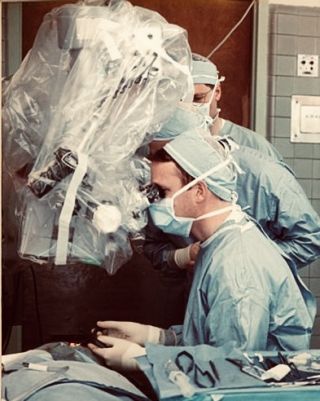Burnout
How Much of Burnout Is Self-Inflicted?
A Personal Perspective: Restoring the balance.
Posted June 16, 2023 Reviewed by Lybi Ma
Key points
- Many of our stressors leading to burnout may be self-inflicted.
- When confronted with numerous stressors, consider addressing those over which you may have some control.
- Consider your level of engagement rather than time allowed when assessing your work-life balance.

I’m a neurosurgeon, and I love my job. But I woke up one day and realized that for months, I had been dreading work. And when I did go in, I was all-to-often biting the heads off of colleagues, grumbling at the nurses, and crossing swords with the medical center’s leadership. Oh my god, I told myself, they finally got me. They had burned me out. That’s how it works, right? A series of external entities conspire to drain our psychic energy beyond a point where we can restore it with our coping mechanisms. And, we burn out.
Thankfully, a psychologist friend presented me with his “90 – 10 challenge.” That was, even if “they” (work demands, lack of support, administrators, E.R. docs, bean counters, and the like) were responsible for 90 percent of my disaffection, what was the 10 percent that I might be able to control, to improve upon, to use as a nucleus for restoration of control over my stressors; to rebuild my resilience. I gave it some thought.
The Ubiquitous Suffering Contest
I conceded that at work I had allowed myself to be sucked into the ubiquitous suffering contest. That is, when Dr. Smith complained that he wasn’t leaving work until 6:30 each night, and his clinics were routinely overbooked by at least five patients, I just had to retort: Jeez, I would kill for a quitting time of 7:00 and a clinic with less 10 ten overbooks. And, when Dr. Jones complained that she only got four hours of sleep on-call the previous night, I felt compelled to up the ante and remind her that on my last three nights on-call, I got none. Yep, it was critical to my being to out-suffer my colleagues. And it wasn’t just me, we all did it.
The longer the hours, the more impediments to doing our jobs, and the more months going at it without a real break, the “happier” we were. On the other hand, the more we attended to our own needs, the more guilty we felt. This was madness. We had created and competed in an environment where suffering was celebrated and self-care was maligned: “Jeez, what’s going on with Bill? He’s been leaving work early lately—says he wants to have dinner with his family.” Why weren’t we celebrating Bill for establishing a more sustainable lifestyle? Why were we equating success with misery? Surely creating reasonable work schedules wasn’t going to crash the industry. Yet, we sure behaved like it would.
And, when I got home, did I shift gears and engage my wife and children on their terms, sensitive to their days, to their triumphs and disasters? Nope. Instead, I dragged all the petty frustrations of my day and disgorged them. Night after night. Not for healthy discourse, mind you, just to accentuate the severity of my wounds. After all, they were my MASH unit, my source of first aid, where I was to be patched up and prepared for re-entry into the fray. Ask me a thing about my sons’ exploits of the day and I would have come up empty. Nothing. Nada. And yet, as they headed off to bed each night, I would strut and fret about how little time I had had with them and about the utter lack of “balance in my life.”
How to Measure Balance
I failed to recognize that work-life “balance” can’t be measured by the time allotted alone. Work will always win. And then we end up fuming about every second we spend on the job. What I wasn’t seeing was that true “balance” comes from an appreciation that we are fully engaging with the critical components of our lives, those people and activities—at home and at work—that fill us with a sense of meaning, and fulfillment, and wonderment, and joy. And that we need to be aware of when our engagement in any of these components is flagging and needs attention and focus—not just time.
And, in contemplating this new approach, I looked about the house and wondered where all the stuff had come from. Was I succumbing to the American penchant for building a castle about myself that would attend to my every need? A fortress, into which I could submerge each evening and never venture out? Bigger, better equipped, further away from the fray. But, in so doing, was I isolating myself from my community? Was I stripping away one of the key ingredients of wellness and resilience: relationships? How had I fallen into this? Was I equating possessions with happiness? Was I creating a lifestyle that only gained in consumerism—trapping me in a cycle of ever-increasing productivity for consumption’s sake (including the accrual of professional accolades)? What if I took my foot off the accelerator a little? Settled for a little less. Could I shift my focus back to what mattered most to me, my family and my friends?
I could go on. I was normalizing the always fraught environment of the hospital and seeing the happy, joyful world outside as foreign and bizarre. I was projecting the seriousness of my work world onto all external activities, even my sons’ sporting events. I was trivializing the concerns of my family and friends because they didn’t share the gravity of those I encountered in the hospital. I was miserable to be around. I was, indeed, burning out. But so much of it was self-inflicted.
Minimizing the Damage
And please don’t think this a problem isolated to my world. We all do it. The suffering contests, the consumerism, and social isolation, the normalizing of toxic environments. We live in a hyper-complex, hyper-demanding world. But with a modicum of self-awareness, self-compassion, and guilt-free self-care, we can minimize the damage we do to ourselves. We can start to restore true balance in our lives. We can build our resilience and burn out our burnout.
References
Simonds, G., & Sotile, W. (2019). Thriving in Healthcare. Huron Consulting Group LLC. ISBN-10: 1622181085


